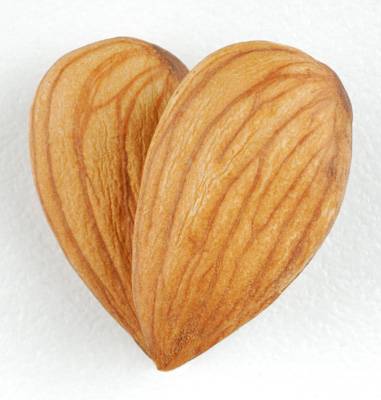Nuts for Vegetarians

Nuts for Vegetarians
Several studies have shown that those who follow a healthy vegetarian diet are less likely to develop obesity, heart disease and Type 2 Diabetes.But, one of the big concerns for many vegetarians is how to get adequate levels of the essential protein and micronutrients found in animal based foods without needing a whole cabinet of mulitvitamins.
Nuts for Life dietitian, Lisa Yates discusses some of the nutrients that need special attention and shows how many of the vitamins, minerals and protein required to maintain optimum health can be found in the humble tree nut (almonds, Brazil nuts, cashews, chestnuts, hazlenuts, macadamias, pecans, pine nuts, pistachios and walnuts) (with the exception of vitamin B12 which only found in animal based foods or products fortified with B12).
Protein - made up of protein building blocks called amino acids, protein plays a vital role in the growth and repair of the body's cells plus is the backbone of enzymes and hormones.4 Some vegetarians may eat dairy and eggs but vegans don't consume any animal-based protein. Overall vegetarians and vegans need to eat a variety of plant protein from nuts, legumes, wholegrains, seeds and soy products. Nuts provide between 10 - 20g of protein per 100g, with almonds and pistachios being particularly rich in protein.
Carbohydrates - if people don't eat enough carbs then the body will convert protein into carbs as a fuel source. Vegetarians need to make sure they eat enough carbs so the proteins they eat are used for what they are supposed to be used for. Chestnuts are rich in low GI carbs and fibre and are a great alternative to potato, pasta and rice. About half your energy intake should come from carbs.
Iron - there are two types of iron in foods haem-iron from animal meats and non haem iron from plant foods. Iron is an essential mineral as it transports oxygen around the body, boosts energy-producing chemicals and helps maintain a healthy immune system.6 Vegetarians can keep iron levels up with non-haem iron from plant foods such as nuts. This form of iron is not as well absorbed by the body, but its absorption can be increased significantly when consumed with a vitamin C containing food/drink e.g. citrus fruit and juices, kiwi fruit, tomato or capsicum. Cashew nuts have non-haem iron levels of 5mg per 100g or 3mg per 60g (two handfuls). About 38% of the recommended daily intake (RDI) for adult men and women over 50 years but only 16% of the RDI for women under 50 years.5 So a variety of non- haem iron rich foods is required for vegetarian women and remember to include a vitamin C rich food with each meal.
Zinc - assists the body in reproduction, growth, wound healing, and generally maintaining a healthy immune system.7 While it's found in many plant foods, its absorption is reduced by phytates found in wheat bran, wholegrains, nuts and legumes and enhanced by dietary protein. While other plant sources such as legumes and tofu contain zinc, adding a handful of nuts, especially Brazil nuts, cashews or pine nuts to evening meals will help boost zinc levels.
Calcium - is a well known bone building nutrient, but what happens if you're a vegan and you don't drink your glass of milk, slice of cheese and tub of yoghurt each day? Yes, there's always soy based milk and yoghurt if fortified with calcium, but nuts can provide a useful top up of dietary calcium, particularly almonds, which contain 250mg per 100g or 150mg per 60g or two handfuls, 18% of the recommended daily intake.
Omega-3 fats - there are two types of omega 3s - marine omega 3s DHA and EPA and plant omega 3s or alpha-linolenic acid (ALA). DHA and EPA may reduce inflammation, protect against heart disease and are needed for brain and eye development.9 Where as ALA are heart health essential. Most of us get our intake of omega-3 fats from seafood but vegetarians can choose from other plant based sources such as linseeds, flaxseed oils, seaweed and nuts. Walnuts are an excellent source of ALA, providing more than 6200mg per 100g. Pecans contain 620mg per 100g, Hazelnuts 120mg per 100g and Macadamias 99mg per 100g.Adults need about 1-1.3g ALA per day. This is about 20g walnuts a day.
Being vegetarian does not mean just removing animal foods from your plate each night. A vegetarian diet requires careful planning to find the correct balance of plant based foods to ensure you get all the essential nutrients your body requires. From protein to zinc, enjoying two or more handfuls of nuts each day as part of your balanced vegetarian diet can help you to meet all your nutritional requirements.
MORE





